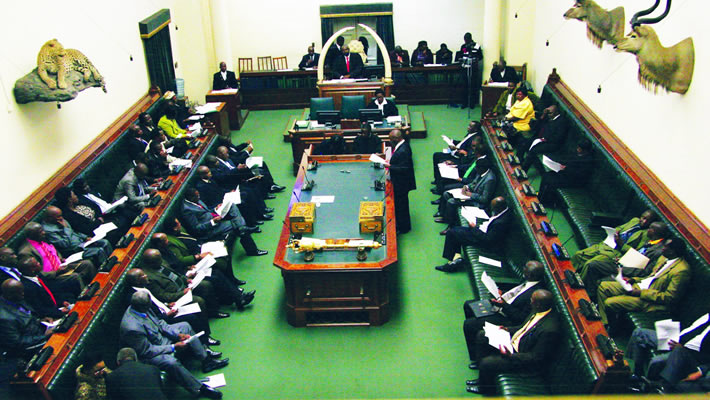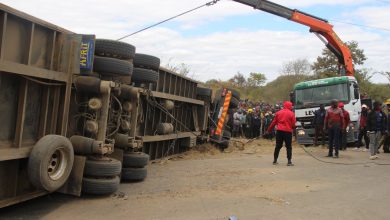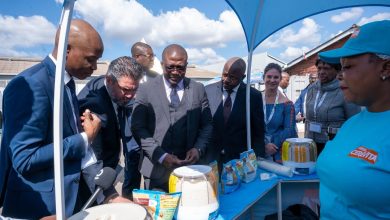Cabinet briefing
THIRTY-SIXTH POST-CABINET PRESS BRIEFING 6TH December, 2022

https://chat.whatsapp.com/HPklHlUIQuV2mStjDtCdeF
1.0 ZIMBABWE’S RESPONSE TO THE COVID-19 PANDEMIC, AND REPORT ON THE PROCUREMENT AND ROLL-OUT OF VACCINES
Cabinet received an update on the Country‘s Response to the COVID-19 Pandemic and a Report on the Procurement and Roll-Out of Vaccines, as presented by the Chairman of the Ministers’ Committee on the National COVID-19 Response, Vice President and Minister of Health and Child Care, Honourable Dr. C.G.D.N. Chiwenga.
The nation is advised that, as at 4 December 2022, the country’s cumulative cases since the outbreak of COVID-19 in 2020 stood at 259 356, with 253 241 recoveries and 5 622 cumulative deaths. The recovery rate was 98%, with 493 active cases having been reported. The scientific indicators show that the pandemic remains under control. The country, nonetheless, should remain vigilant against COVID-19. Accordingly, provinces will strengthen the implementation of COVID-19 vaccination during the ongoing poliomyelitis vaccination campaign and ensure that all stakeholders including political leaders, local authorities, partners and donors are mobilized for this exercise. Enforcement of COVID-19 regulations will also be strengthened, especially during the festive season
Regarding the national vaccination programme, Cabinet wishes to inform the nation that, as at 4 December 2022, a total of 6 574 434 first doses of the COVID-19 vaccine had been administered, while 4 924 009 people had received their second dose, and 1 253 395 their third dose. This translates to a national coverage of 58.5%. The country should therefore remain focused and continue pushing for higher vaccination coverages in order to provide maximum protection to all citizens. A strengthened vaccination plan and electronic register that enables vaccination teams to easily identify and follow up those who have not yet received their second or third dose is due for introduction, and the Ministry of Health and Child Care will update the nation progress made. This approach will not only help to increase the COVID-19 vaccine uptake, but will also strengthen the under-five year old Expanded Programme on Immunisation.
2.0 REPORT ON THE STATUS OF NATIONAL GRAINS, WHEAT HARVESTING AND DELIVERIES
Cabinet received and considered the weekly Report on the Status National Grains, Wheat Harvesting and Deliveries, as presented by the Minister of Lands, Agriculture, Fisheries, Water and Rural Development, Honourable Dr Anxious Jongwe Masuka.
Cabinet advises that the grain stocks at GMB as at 5 December, 2022 stood at 551 032 metric tonnes, comprising 472 950 metric tonnes of maize and 78 082 metric tonnes of traditional grains. Based on the country’s forecasted monthly consumption rate of 49 295 metric tonnes, the available grain will last for 11.2 months. Allocations to millers remain pegged at 25 000 metric tonnes per month, and the monthly social welfare grain allocation stands at 24 295 metric tonnes.
The country’s total wheat stocks stands at 211 049 metric tonnes, being 176 549 metric tonnes held by the Grain Marketing Board (GMB) and 34 500 metric tonnes by millers. This will provide 8.4 months’ cover at a consumption rate of 21 000 metric tonnes per month. The cumulative harvested area of the 2022 winter wheat crop stands at 76 000 hectares, which is 94% of the planted area, with the total production standing at
358 978 metric tonnes of wheat.
Meanwhile, cumulative grain sales of maize, wheat, soyabeans and traditional grains by the GMB since April 2022 amount to about ZW$25 billion, comprising 236 725 metric tonnes. The private sector has purchased 145 489 metric tonnes of grain. Cabinet reassures the nation that the available grain stocks indicate that the country is food secure.
3.0 SUNDRY UPDATES TOWARDS A US$12 BILLION MINING INDUSTRY BY 2023
Cabinet received and adopted Sundry Updates of the Mining Sector as presented by the Minister of Mines and Mining Development, Honourable Wiston Chitando.
The public is advised that Cabinet agreed to a policy change whereby all chrome ores will be traded through the Minerals Marketing Corporation of Zimbabwe (MMCZ). The MMCZ, through a Chrome Ores Coordination Committee, will set quarterly prices of chrome ore which miners and traders will trade at. The Committee will comprise representatives of Smelters and the Chrome Small-Scale Miners Association.
Cabinet also approved a number of special grant applications in the following categories:
- extension to current special grants which have successfully been exploited;
- empowerment of war veterans syndicates; and
- strategic development and expansion projects towards the US$12 billion milestones.
4.0 THIRD QUARTER PERFORMANCE REPORT OF THE NATIONAL DEVELOPMENT STRATEGY FOR 2022
Cabinet adopted the Third Quarter Performance Report of the National Development Strategy for 2022, as presented by the Minister of Finance and Economic Development, Honourable Professor Mthuli Ncube.
The nation will recall that Cabinet approved the NDS 1 Monitoring and Evaluation Framework in 2022, which requires quarterly reports of progress under the 14 Thematic Working Groups (Pillars) of the Strategy. Highlights of the progress are outlined below.
Under the Economic Growth and Stability Pillar, the economy remained stable, as reflected by the decline in month-on-month inflation from 30.7% in July 2022 to 3.5% in September 2022, reversing the runaway inflation trend which was experienced since the beginning of the year. Annual inflation also declined between August and September 2022, reflecting the effectiveness of the monetary and fiscal measures instituted to stabilize the economy. In the Food and Nutrition Security Pillar, the proportion of food secure people in the third quarter was 70%, according to the Zimbabwe Vulnerability Assessment Committee (Zim VAC) Report. The rest is supported by Government and development partners. The review period indicates a positive progression towards meeting food and nutrition security targets, with maize output at 1.6 million metric tonnes.
Under the Moving the Economy Up the Value Chain and Structural Transformation Pillar, the third quarter manufacturing capacity utilisation stood at 66% surpassing the target of 62% by 4 percentage points. Under the Infrastructure and Utilities Pillar, the Hwange Power Station Units 7and 8 are 97.2% complete, while the Second Phase of the Emergency Road Rehabilitation Programme (ERRP 2) continues to register significant progress. The rest of the Pillars for which progress is outlined in the quarterly report are as follows:
• Digital Economy;
• Housing Delivery;
• Human Capital Delivery;
• Health and Wellbeing;
• Image Building, International Engagement and Re-engagement;
• Devolution and Decentralisation;
• Youth, Sport, Arts and Culture;
• Social Protection;
• Environmental Protection, Climate Resilience and Natural Resources Management; and
• Governance.
5.0 PRINCIPLES OF THE RESEARCH AMENDMENT BILL
Cabinet considered and adopted the Principles of the Research Amendment Bill, as presented by the Vice President and Minister of Health and Child Care, Honourable Dr. C.G.D.N. Chiwenga.
The Bill amends the Research Act [Chapter 10:22] and aligns it to the Constitution, to the Public Entities and Corporate Governance Act as well as to the imperatives of modernizing and industrializing the country. It further provides for the establishment of a Research Fund and strengthens the Secretariat of the Research Council of Zimbabwe to meet the demands of a knowledge-based economy.
Cabinet wishes to highlight that the Bill will require members of the Council to be subjected to performance contracts and evaluations and declaration of assets and conflicts of interest. The purpose of the Fund alluded to above is to, among others, support and promote the creation of new knowledge, research and innovation. To motivate private players, Treasury may be requested to consider incentives such as tax rebates for funds allocated for research purposes.
The amendments will enhance and promote research in the country for innovation and industrialisation, which are the drivers for the realization of Vision 2030 and beyond.
6.0 REPORT ON THE HIGH-LEVEL COMMONWEALTH ASSESSMENT MISSION TO ZIMBABWE
Cabinet received the Report on the High-Level Commonwealth Assessment Mission to Zimbabwe, held from 12 to 18 November 2022, as presented by the Minister of Foreign Affairs and International Trade, Honourable Dr F.M. Shava.
The High Level Mission was led by the Commonwealth Assistant Secretary General, Professor Luis Francesci, and its objective was to conduct an on-site evaluation of the progress made by Government in implementing legislative, political, electoral and economic reforms, and the country’s readiness to re-join the Commonwealth. The Mission held a joint meeting with the Ministers of Foreign Affairs and International Trade; Justice, Legal and Parliamentary Affairs; Finance and Economic Development; Home Affairs and Cultural Heritage; Public Service, Labour and Social Welfare; and Information, Publicity and Broadcasting Services. The Mission also met other stakeholders including the Zimbabwe Electoral Commission, Faith-Based Organisations, Civil Society Organisations; the Academia, members of the Diplomatic Corps, Media Practitioners, and persons of interest to the Mission. The Mission also paid a courtesy call on His Excellency the President, Cde Dr E. D. Mnangangwa.
Cabinet advises that the Secretary-General of the Commonwealth is likely to circulate the Assessment Mission Report to Member States for consideration in January 2023. Subsequently, Commonwealth Member States will respond and determine the way forward.
7.0 REPORT ON THE OUTCOMES OF THE 27TH UNITED NATIONS FRAMEWORK ON CLIMATE CHANGE CONFERENCE OF PARTIES (COP 27)
Cabinet adopted the comprehensive Report on the 27th Session of the Conference of Parties (COP 27) to the United Nations Framework on Climate Change, which was held in Sharm El-Sheikh Egypt, from the 6th to the 18th of November 2022, as presented by the Minister of Environment, Climate, Tourism and Hospitality Industry, Honourable N.M. Ndlovu.
The Conference was preceded by a Summit of Heads of State and Government which was attended by His Excellency the President as reported at the 33rd Post-Cabinet Press Briefing. Key outcomes of the Conference of Parties include the following:
- A breakthrough agreement was reached on a new “Loss and Damage” Fund for Vulnerable Countries which sets the pace for the way forward on funding loss and damage and addresses the impacts of climate change on communities.
- The Global Goal on Adaptation was adopted by COP 27 to inform the first Global Stocktake with the aim of improving resilience amongst the most vulnerable. New pledges totaling more than US$230 million were made to the Adaptation Fund to help some vulnerable communities to adapt to climate change.
- The COP 27 gave prominence to young people, who made their voices heard through the first-of-its kind pavilion for children and youths, as well as through the first-ever youth-led Climate Forum.
- The five-year work programme to promote climate technology solutions in developing countries was launched.
- COP 27 noted the progress made by developed countries in the market-based carbon trade system.
Cabinet wishes to highlight that Zimbabwe, for the first time, mounted a pavilion where various Zimbabwean stakeholders conducted different events. These included the launch of the Zimbabwe Climate Change Gender Action Plan, bilateral meetings, meetings with potential investors and international participants. The Zimbabwe Youths also conducted five events on various topics which attracted huge crowds.
While the COP 27 was dubbed the “Implementation COP”, it was apparent that developed countries want to abdicate their responsibility of financing efforts to address climate change. However, the establishment of the Loss and Damage Fund will go a long way in providing relief funding to Governments which are spending a lot of money responding to disaster caused by climate change.
8.0 REPORT ON THE 19TH CONFERENCE OF PARTIES ON THE CONVENTION ON INTERNATIONAL TRADE IN ENDANGERED SPECIES OF WILDLIFE, FLORA AND FAUNA (CITES)
Cabinet received the Report on the 19th CITES Conference held in Panama City from 14 to 25 November 2022, as presented by the Minister of Environment, Climate, Tourism and Hospitality Industry, Honourable N.M. Ndlovu.
Cabinet wishes to highlight that Zimbabwe made four proposals at the CITES Conference. These were as follows:
- Zimbabwe proposed an amendment to the voting procedure to assign several votes per representative proportionate to the population size of the species under discussion or whose status is subject to voting. Some countries supported the proposal which was however rejected following a vote.
- The country proposed to remove the requirement that Zimbabwe’s elephants listed on Appendix II can only be traded to “acceptable” destinations. The proposal had 15 members in favour, 83 against and 17 abstained.
- The proposal on establishing a Rural Communities Committee, received no consensus from members and an inter-sessional working group was set up to consider the issue and make recommendations to CITES.
- Zimbabwe, in conjunction with Botswana, Namibia, Cambodia and Eswathini submitted a proposal to include consideration of livelihoods and food security which was also rejected.
Other member states made a total of six submissions to CITES in the following areas:
- Transfer of the populations of African Elephant in Botswana, Namibia, South Africa and Zimbabwe from Appendix II to I which was rejected;
- Transfer of Common Hippopotamus from Appendix II to I which was rejected;
- International trade in live African elephant specimens, for which CITES agreed to establish a dialogue platform at which expert groups and interested parties would participate;
- One Health and the CITES: Reducing Human and Animal Health Risks from Wildlife Trade to prevent the risk of future pandemics as a result of zoonotic pathogens and disease transmission, which is beyond the scope of the CITES mandate, and a working group was established to prepare a document on the issue;
- Establishing a Fund accessible to Range States Upon Non-commercial Disposal of Ivory Stockpiles, which was rejected; and
- Definition of the term “appropriate and acceptable destinations”, for which a proposal by the EU to establish a legal framework for the relevant trade was adopted.
Given the divisions that continue to widen among African regions at CITES, Cabinet agreed that the matter be taken up through engagements with fellow African nations and, where possible discussed at the AU Council of Ministers Meeting so that Africa comes up with a common position devoid of the influence of the former colonial masters and civil society organisations.
9.0 REPORT ON THE PRIORITY PROJECTS FOR THE 3RD 100-DAY CYCLE OF 2022
Cabinet considered and approved Reports by Ministers under the 3rd 100-Day Cycle of 2022.
(a) The Minister of Energy and Power Development presented the progress on projects under his portfolio as follows:
(i) the Hwange 7 and 8 Expansion Project in Matabeleland North Province has achieved a 97.2% completion level to date, with Unit 7 set for commissioning by end of December 2022;
(ii) the Alaska-Karoi (132KV) Power Transmission Rehabilitation Project in Mashonaland West Province achieved 38% overall completion level surpussing the 30% set for the targeted period;
(iii) on the Great Zimbabwe Mini Hydro Power Station in Masvingo Province which is entirely financed through a Public Private Parternship, the set target of completing the access road achieved 95%, while the Lease Agreement with Zim Parks was signed, and the contract for the construction of the transmission line is set for signing by mid December 2022;
(iv) on the Mataruse Large Anchor Project in Gutu District of Masvingo Province, it is reported that the 33.25 km Voltage Line leading to all benefitting institutions was completed. Transformers were delivered to the following institutions; Dandavare Primary School and Gudza Primary and Secondary Schools, Ruti Irrigation Scheme, Mataruse Business Centre, Mataruse Primary and Secondary School, Clinic and AREX.
(v) Pertaining to the Masenda Project in the Mudzi District of Mashonaland East Province, all the 18,84 km of the 33kv High Voltage line and 2,2 km medium voltage line were completed. The project has benefitted the following institutions: Masenda Business Centre, Rural Health Centre, Primary and Secondary School, AREX as well as Kawaza Rural Health Centre, AREX and Business Centre; and Makochera Primary School and AREX.
I have invited the Secretary for Energy and Power Development to give an update on the country’s power supply situation at the end of my presentation.
(b) The Minister of Foreign Affairs and International Trade reported that works are at various stages of completion at the following projects:
(i) Refurbishment of the Ambassadors’ and officials’ residences in Johannesburg and Pretoria in South Africa and Berlin, Germany.
(ii) Refurbishment of Chanceries and Officers’ residences in Pretoria, South Africa, Maputo and Beira, Mozambique, and Washington DC, USA;
(c) The Minister of National Housing and Social Amenities reported progress on Projects under his purview as follows:
1) Dzivaresekwa Flats Development in Harare Province, overall progress for Blocks 7,8,9 and 10 stands at 71.59%;
2) Binga Housing Project in Matabeleland North Province, overall progress stands at 70%, while construction of 17 x 3 roomed cottages is at 98% of completion;
3) at the Emphumalanga Infrastructure Development Project in Hwange District of Matabeleland North Province, construction of water and sewer reticulation is at 66%; roads and storm water drains at 74%; and
4) The Marondera Flats Housing Project in Mashonaland East Province, the construction of 4 x 4 storey blocks of flats (64 units) for civil servants housing overall progress is 73%.
I now call upon the Secretary for Energy and Power Development, Eng. Gloria Magombo, to give an update on the country’s power supply situation.
I THANK YOU!




